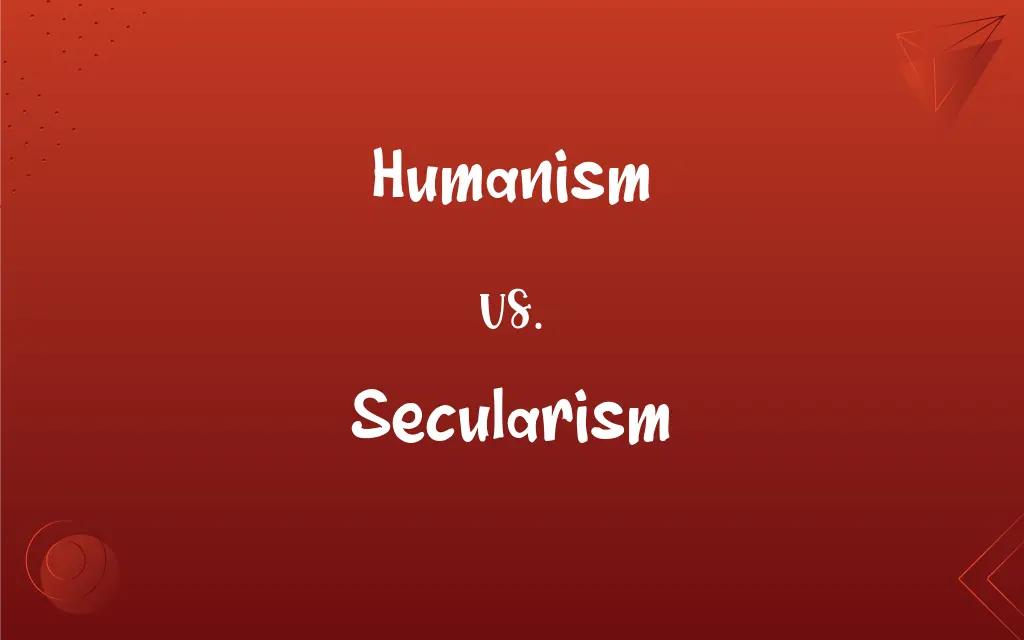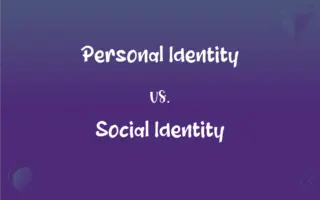Humanism vs. Secularism: What's the Difference?
Edited by Aimie Carlson || By Janet White || Published on January 7, 2024
Humanism is a philosophical stance emphasizing human values and potential, while secularism advocates the separation of religion from civic affairs and government.

Key Differences
Humanism is a philosophy centered on human interests and values, promoting human dignity and potential. Secularism, however, is a principle that involves separating religion from government and public affairs.
Humanism arose during the Renaissance, focusing on classical learning and human potential. Secularism emerged as a political and social concept, advocating for religious neutrality in state affairs.
Humanism emphasizes ethical living, critical thinking, and the importance of human experiences. Secularism is focused on ensuring that government and societal decisions are made independently of religious influence.
Humanism plays a role in influencing personal moral and ethical perspectives. Secularism shapes the way institutions and governments interact with and regulate religious practices.
Humanism can be seen in educational and cultural movements that emphasize human creativity and reasoning. Secularism is evident in laws and policies that separate religious practices from state functions.
ADVERTISEMENT
Comparison Chart
Focus
Human values, dignity, and potential.
Separation of religion from state and public life.
Origin
Emerged during the Renaissance.
Developed as a response to religious dominance.
Key Values
Ethical living, critical thinking.
Religious neutrality in state affairs.
Societal Role
Influences personal morality and ethics.
Guides governmental and institutional policies.
Cultural Manifestation
Seen in education and cultural movements.
Evident in laws and government policies.
ADVERTISEMENT
Humanism and Secularism Definitions
Humanism
An emphasis on human-centered reasoning and ethics.
His humanism is reflected in his commitment to humanitarian causes.
Secularism
The principle of separating religion from government affairs.
Secularism ensures the neutrality of laws in a diverse society.
Humanism
A focus on human interests and the value of human life.
Humanism influenced the development of modern democratic ideals.
Secularism
An ideology advocating for non-religious governance and public life.
Secularism supports the idea of a state free from religious influence.
Humanism
A rationalist outlook emphasizing human values and potential.
The humanism movement led to greater focus on secular education.
Secularism
The belief in equal treatment of all religions by the state.
Secularism is key to maintaining peace in a multi-religious country.
Humanism
A philosophical stance that prioritizes human welfare and rights.
Humanism guides her approach to social work and activism.
Secularism
The separation of religious institutions from state institutions.
Secularism is evident in the separation of church and state.
Humanism
A cultural movement that revived classical art and learning.
Renaissance humanism changed the course of European art and history.
Secularism
A system where religion does not dictate public policy or laws.
Through secularism, the government makes decisions based on rationality, not religion.
Humanism
A system of thought that focuses on humans and their values, capacities, and worth.
Secularism
Religious skepticism or indifference.
Humanism
Humanism A cultural and intellectual movement of the Renaissance that emphasized human potential to attain excellence and promoted direct study of the literature, art, and civilization of classical Greece and Rome.
Secularism
The view that religious considerations should be excluded from civil affairs or public education.
Secularism
Neutrality towards all religions.
State secularism
Secularism
The political belief in the separation of church and state, i.e. the position that religious belief should not influence public and governmental decisions.
Secularism
The state or quality of being secular; a secular spirit; secularity.
Secularism
The tenets or principles of the secularists.
Secularism
A doctrine that rejects religion and religious considerations
FAQs
Does humanism reject religion?
Humanism doesn't necessarily reject religion but focuses on human values and reasoning.
Do secular societies ban religious practices?
No, secularism allows religious freedom but keeps religion separate from state affairs.
Can a religious person be a humanist?
Yes, one can hold religious beliefs and still embrace humanist values.
How does humanism view science?
Humanism generally embraces science as a means to understand the world.
Is secularism anti-religious?
Secularism is not anti-religious; it advocates for separation of religion and state.
Can secularism coexist with religious laws?
Secularism advocates for laws to be independent of religious doctrines.
What role does ethics play in humanism?
Ethics is central to humanism, focusing on human-centered morality.
Can a state be secular and have a state religion?
In practice, some secular states maintain a nominal state religion, but with neutrality in governance.
Does secularism affect personal religious practices?
Secularism mainly affects public and state matters, not personal religious practices.
Can secularism lead to societal harmony?
Secularism aims to promote harmony by ensuring religious neutrality in public affairs.
Does secularism lead to a decline in religious belief?
Secularism does not aim to reduce religious belief, but to separate it from governance.
Are humanism and secular humanism the same?
Secular humanism specifically combines humanist principles with a non-religious approach.
How do humanism and secularism view human rights?
humanism from ethical principles and secularism from a legal standpoint.
Do secular governments fund religious institutions?
Typically, secular governments do not fund or favor specific religious institutions.
How does humanism impact social justice?
Humanism often drives initiatives for social justice based on human dignity and equality.
Can humanism shape moral decisions without religion?
Yes, humanism provides a framework for ethical decisions based on human values.
Is secularism a form of government?
Secularism is a principle that can guide the nature of a government.
How does humanism influence education?
Humanism promotes a broad, critical, and rational educational approach.
Is secularism a response to religious conflict?
Yes, secularism often emerges as a response to avoid religious conflict and ensure neutrality in governance.
Is humanism tied to any political ideology?
Humanism is not inherently political but aligns with various liberal and democratic principles.
About Author
Written by
Janet WhiteJanet White has been an esteemed writer and blogger for Difference Wiki. Holding a Master's degree in Science and Medical Journalism from the prestigious Boston University, she has consistently demonstrated her expertise and passion for her field. When she's not immersed in her work, Janet relishes her time exercising, delving into a good book, and cherishing moments with friends and family.
Edited by
Aimie CarlsonAimie Carlson, holding a master's degree in English literature, is a fervent English language enthusiast. She lends her writing talents to Difference Wiki, a prominent website that specializes in comparisons, offering readers insightful analyses that both captivate and inform.








































































